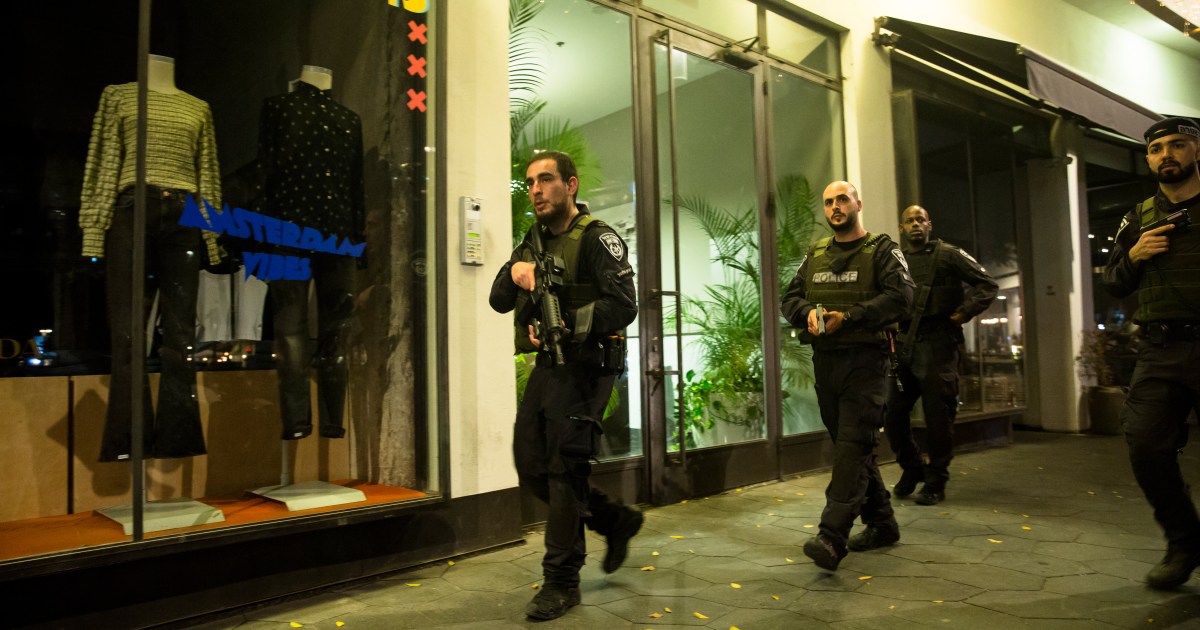For the second day, the Israeli security forces continue their search for the perpetrators of Operation Elad east of Tel Aviv, while dozens of occupation patrols stormed at dawn today, Saturday, the town of Silat Al-Harithiya in Jenin and blew up the house of the captive Omar Jaradat.
The Inspector General of the Israeli Police ordered to reinforce patrols in city centers and public parks to search for two people who carried out an attack two days ago that killed 3 Israelis in the town of Elad near Tel Aviv.
The search process extends on a large scale to include Palestinian cities within the Green Line and villages close to the line of contact.
Yesterday morning, the Israeli police and intelligence published photos and names of two workers from the village of Rummana, west of Jenin, suspected of carrying out the Elad attack, which left 3 wounded in addition to the three dead.
Yesterday, the Israeli authorities allowed the publication of information that one of the dead in Operation Elad was the one who transported the two attackers from the separation fence into the town where the attack took place.
According to this information, the two attackers killed Oren Ben Yiftach, who transported them in his private car and got off immediately, continued the killing, and then fled.
house demolition
In Jenin, the Israeli occupation forces stormed the town of Silat Al-Harithiya, west of Jenin Governorate, and blew up the house of the captive Omar Jaradat.
Al-Jazeera correspondent reported that more than 100 military patrols and reconnaissance planes stormed the village to carry out the demolition.
The correspondent confirmed that the force came under fire from Palestinian youths, and the storming process involved confrontations that resulted in the injury of 3 Palestinians by Israeli soldiers' bullets.
She pointed out that the occupation forces blew up the house of the prisoner Omar Jaradat, whose demolition decision was approved by the Supreme Court, claiming that he and his brothers were involved in the operation carried out in the "Homish" settlement near the entrance to the village of Burqa, northwest of Nablus on December 16, in which an Israeli settler was killed.
The Israeli occupation army published a video clip of the demolition of the house of the prisoner Omar Jaradat.
The pictures show an Israeli army unit storming the house of the prisoner Jaradat and mining it before destroying it.
For its part, Islamic Jihad condemned the Israeli occupation forces' destruction of the home of the prisoner Omar Jaradat.
In a press statement, the movement described targeting safe houses as a crime that reflects the extent of confusion and security confusion experienced by the occupation, and a desperate attempt to cover up its image that was destroyed by the Palestinian resistance, as it put it.
For its part, the Palestinian Prisoners Club accused the Israeli occupation authorities of escalating the crime of collective punishment targeting the families of the prisoners.
And he considered - in a statement - the demolition of the house of the prisoner Omar Jaradat as part of the revenge operations pursued by the occupation authorities.
The Prisoner's Club said that demolishing homes constitutes the most prominent systematic policy associated with the history of the occupation, although international institutions consider it a violation of the principles of international law.
settlement plan
In another context, the Higher Committee for Planning and Construction of the Israeli Civil Administration in the West Bank will hold a meeting next week in order to ratify the project to build about 4,000 new settlement units in the occupied Palestinian territories, including Al-Touq settlements around Jerusalem.
These new units will be built within 25 construction projects in West Bank settlements, specifically inhabited by orthodox Jews.
On the other hand, Knesset member Walid Taha of the United Arab List (the political arm of the Islamic movement) and a participant in the ruling coalition in Israel warned of the repercussions of this step, and said that the decision would be a serious political mistake and would have serious repercussions.
In turn, Hamas stressed that the settlement and forced displacement of the people of the West Bank will not give the occupation legitimacy and will be met with more steadfastness and comprehensive confrontation.
The movement stressed - in a statement - that the occupation's approval of the construction of thousands of settlement units and its decision to demolish about 12 Palestinian villages is a dangerous escalation and a blatant encroachment on the occupied lands and a crime of ethnic cleansing and forced displacement of the Palestinian people.
For its part, the Palestinian presidency and the Ministry of Foreign Affairs and Expatriates called on the US administration to pressure the Israeli government and discourage it from its willingness to approve settlement plans to build new settlement units in the West Bank.
The official spokesman for the Palestinian presidency, Nabil Abu Rudeineh, warned of the danger of the occupation authorities' approval of building thousands of new settlement units.
At the same time, he warned of the occupation's plan to carry out a forced displacement and ethnic eviction of thousands of Palestinian citizens from the villages of "Masafer Yatta" in Mount Hebron in the southern West Bank.

